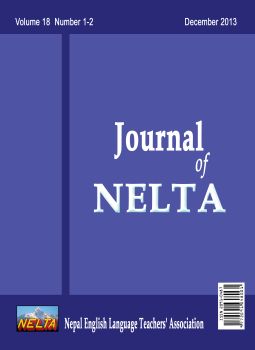Critiquing Economic Values in English Language Teaching: Materials Problems and Critical Solutions Facing Teachers
DOI:
https://doi.org/10.3126/nelta.v18i1-2.10327Keywords:
ELT, Colonialism, Globalization, Textbooks, Cultural criticismAbstract
This paper contends that the English language teaching industry is implicitly imbued with Western cultural values which, whilst emanating from the ideological discourse of colonialism, have now evolved into an aggressive corporate colonialism. An examination of various materials employed in ELT finds that they are saturated with market driven Western values and product placements, which, if not explicated properly, can confuse students who may come from very different schematic backgrounds (Widdowson, 1990). A more critical classroom approach is therefore advocated, where foreign English language students are encouraged to use vocabulary to critique cultural contents encountered in ELT materials, affording them the chance to engage with English more dynamically. A 2012 teaching approach is described, which sought to achieve this aim within the context of a Japanese university English conversation class. The effectiveness of this approach is then assessed and discussed through the examination of quantitative and qualitative student response data.
DOI: http://dx.doi.org/10.3126/nelta.v18i1-2.10327
Journal of NELTA, Vol 18 No. 1-2, December 2013; 18-30
Downloads
Downloads
Published
How to Cite
Issue
Section
License
© Nepal English Language Teachers’ Association (NELTA)
Authors are required to transfer their copyright to the Nepal English Language Teachers' Association (NELTA)
The Journal of NELTA is copyright by Nepal English Language Teachers’ Association (NELTA). Apart from citing/referencing in academic works, no part of any materials may be reproduced by any process without prior written permission from its copyright owner – NELTA. Requests and enquiries concerning reproduction and rights may be addressed to NELTA or the editorial board at neltaeditorialboard@gmail.com.




